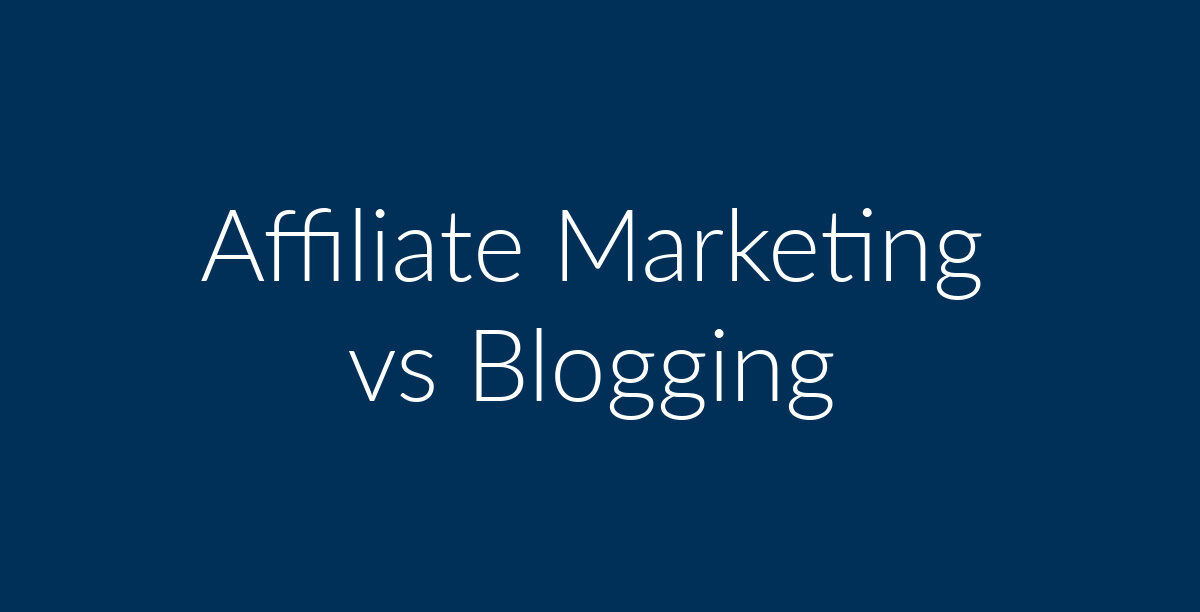Do you own a business? Are you struggling to pick between affiliate marketing and blogging when it comes to reaching out to customers? It’s 2020, and the one thing that remains constant within the digital marketing world is change. Tucked within the debates that rage on various aspects of marketing are questions on whether or not brands should choose affiliate marketing instead of blogging as a way of reaching their target audiences. Hi, My name is Francisco, and I am the owner of Planet Marketing, a Digital Marketing agency. My company specializes in Google Ads, Facebook Ads and Remarketing. I have been in the business for years and am, therefore, well placed to contribute to the affiliate marketing vs blogging debate. My company runs an affiliate and I have hundreds of people around the world selling my products. Not only that, but I am also an affiliate for other brands, who I market through this blog. So, you can be sure that I know what I am talking about here! In this article, I am going to;
- Define Affiliate Marketing
- Define blogging
- Help you decide what’s best for your brand
- Show you why the two are not mutually exclusive
What is Affiliate Marketing
Affiliates can be thought of as the modern version of the salesperson of yesteryear. Today, instead of going around the neighborhood totting samples, much to the annoyance of by harried mothers, affiliates roam around the digital landscape on the hunt for clients. So, what exactly is affiliate marketing?
Affiliate marketing is a program in which brands engage the services of companies and individuals who are paid a commission when the desired outcome is achieved. This outcome could be a sale, a signup or any other goal.
Which tools are used by affiliates?
This article only takes a partial glimpse at affiliate marketing. If you want to learn more, check out my comprehensive article on how affiliate marketing works. The following, in any case, are some of the tools that are used by affiliates to make sales;
- Blogs: Yes, this is the primary tool used by affiliates. That is why the topic of this article, affiliate marketing vs blogging may be something of a moot point, as you will see later in this article.
- Social Media: Social media is another useful tool that is used in affiliate marketing. With Facebook having over 2.4 billion monthly active users, as an example, there is no end to the number of people that you can reach on the platform. Most affiliates use social media to market to people within their social circles. This increases the chances that they will succeed in their efforts to make sales.
- Word of mouth: Affiliate marketing also happens through word of mouth. This has a greater chance of succeeding since this type of interaction is much more personal.
Blogging
Now, let me turn to blogging. Blogging is very much a part of the experience of owning a website. Unfortunately, not many businesses recognize the power of blogging as a marketing tool. For most brands, being online is limited to having a static website. Content on there is seldom refreshed. This cursory approach is, it has to be said, rather outdated. I have been in business for over 15 years, and can attest to the power of blogging as a tool to help get brands up there with the best. But what is a blog and how exactly is it helpful.
Blog vs website

Most people are confused about the difference between a blog and a website. What you need to understand is that the difference lies in the issue of the frequency of content renewal. A website mostly has static content. I have already mentioned that most brands have websites whose content seldom changes.
A blog, on the other hand, gets new content on a regular basis. There is debate over how frequently this should be done. There is no limit, in any case, to the number and kind of topics that can be covered on a blog. Most people limit themselves, however, to issues that relate to their line of business. Let’s assume that your company manufactures automotive tires. You blog would, therefore, cover such topics as; “how often to change tires,” “how long do tires last,” “how to change a tire,” “what to do when you have a blowout on the highway” and much more. However, you could also go on to talk about the cars themselves and any other topic that you feel is relevant.
Why businesses should bother blogging
Okay, so, you have hired the services of a web developer who has set up a static website for your company. You look at it and say to yourself; “damned, the thing looks good!” Is there, in such a situation, reason to bother with blogging? The answer to that is, yes! Having a static website is great, but it will do nothing for you in terms of getting the customers that you are looking for. But why is that the case?
It’s all about Search Engine Optimization (SEO)

SEO is something of a craze within the digital marketing world. It’s so big that there are countless agencies out there that carry out SEO services. I know; Planet Marketing is one such SEO agency. In short, SEO is all about taking measures to give web pages greater visibility to Search engines such as Google and Yahoo. The goal is for a web page to appear at the top of search engine result pages.
SEO Tools
If you ask around, you will be told that there are various SEO tools out there. That may well be true, but the most important, without doubt, is content creation. I know, this statement will raise hackles in some quotas. However, the fact is only logical. People that carry out search queries are looking for various products, and content is what enables then to find what they are looking for. Content, as they say, is king. This statement may have become something of a cliché, but it rings true, nevertheless. And how do you get content? THROUGH BLOGGING, of course!
Why blogging is important
Blogging is the thing to do, as far as SEO is concerned, since it’s THE WAY of getting search engine visibility. Google bots, as an example, are always on the hunt for new content. If you get some on your site on a regular basis, then they will take your site seriously and will reward it with a higher rank. Blogging is also important as a way of engaging your potential customers in meaningful conversation. You do this by providing them with useful (and sometimes useless) information. By doing so, you give yourself the chance to convince them to take the desired action.
Affiliate marketing vs Blogging: Which one should brands go for?
Okay, now I get to the crux of this article. Many businesses out there are faced with a choice between affiliate marketing and blogging as a way of generating sales. That’s particularly the case for small businesses that may not initially have the luxury of choosing both. So, which one is the best marketing tools for businesses? Should you engage a troop of affiliates or should you stick to blogging?
I would choose affiliate marketing
There is no doubt in my mind that affiliate marketing is the best option when it comes to marketing for brands. In fact, the whole thing is not comparable. Blogging is great, but it is rather limited. So why do I think businesses should choose affiliate marketing over blogging?
- Blogging is mostly limited to a single website. Let’s assume that you have added a blog to your company’s website. You may hire many content writers, but the fact will still remain that you will only have one platform on which to make your pitch.
- The great thing about affiliate marketing is the fact that almost all affiliates are also bloggers. Most of the people who engage in affiliate marketing have blogs of their own. So, by hiring them, you increase your reach to a level you would never be able to do on a single platform. As an example, if you are a web host, you are much more likely to have success if you have a thousand people talking about your products on their websites than when you are only doing it on your own website.
- Affiliates have other tools at their disposal. These include social media. Of course, it can be argued that blogging also uses social media. Again, the issue of reach comes into play. You are better off having a thousand people share information about your products and services than when you do it on your own.
- Running an affiliate marketing program does cost money, but you only get to pay when someone makes a sale. That’s the beauty of affiliate marketing. It’s marketing for you without all the usual overheads.
Why not use blogging AND affiliate marketing?
In my view, there is really no need to engage in this affiliate marketing vs blogging debate. That’s because, I believe, there is nothing stopping you from using both tools to help grow your business. Instead of choosing one over the other, brands should set up affiliate marketing programs to help complement the work that they are doing on their blogs. Indeed, you could use your blog to marketing your affiliate marketing programs, as I am doing in this very article!



